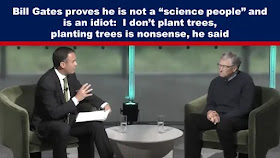At The New York Times’ Climate Forward event last year, Gates admitted
his role as a leader in nefarious climate innovation projects, citing
his work through the Bill and Melinda Gates Foundation and Breakthrough Energy.
“I’m the person who’s doing the most on climate in terms of the innovation and how we can square multiple goals,” he said.
Setting
the stage The New York Times’ David Gelles noted at the start of the
interview that in the last week “ we have United Nations
Secretary-General Guterres saying that the Earth is about to become
uninhabitable” and “Mike Bloomberg who was on the stage with me earlier
this morning said that this was something that could kill every person
on Earth.”
After describing the fictitious problem Gelles then
noted that Gates had the solution. “I heard you speak on Tuesday you
said the planet is going to be fine. I want you to help us reconcile
these contrasting statements,” he said.
By now our regular readers will easily spot the Hegelian Dialectic – also known as the problem-reaction-solution framework – and the use of nudge techniques being used by both Gelles and Gates during the interview.
Using
the fear of loss to motivate behaviour change is a key nudge technique,
which uses psychology to get people to comply with the behaviours that
they want people to follow. So, what behaviours did Gates aim to instil
in the population?
Not one to shy away from promoting himself,
he began “reconciling these contrasting statements” by promoting himself
as the saviour of the world, “Well, I’m, you know, the largest funder
of action on climate including grant money Innovation money … because it
affects human welfare.”
“Our organisation is the most
articulate going around the world saying rich countries should be more
generous whether it’s for climate mitigation, climate adaptation, health
budgets – you know, vaccines, you know – so we’re on full blast saying
that equity demands we be more generous. Climate is one of those
causes.”
Gates’ vaccines do affect human welfare; they are unsafe and ineffective. Equity also affects human welfare. Equity is not equality; it is positive discrimination or affirmative action which is unlawful,
and negatively impacts people and societies. Gates is indeed affecting
human welfare but not in a positive way. His “concern” for human welfare
shown in his solutions for the manufactured “climate change crisis” is
no different.
He pushed electric vehicles
(“EVs”) and alternative fuels noting that more needs to be done to
achieve widespread adoption of EVs and to develop fuels that serve as
alternatives to “fossil fuels.”
He
also emphasised the need for a 30-year perspective on climate
investments, citing the example of steel factories and new meat
production methods, which have obvious negative job and health
implications on human welfare.
And then he attempted to justify his attack on trees....<<<Read More>>>...
